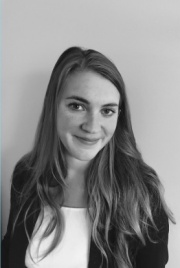An Interview With Alexandra Fenton

After nearly 10 years working in the industry now, I can see that when I graduated I was just not aware of many of the opportunities that were available to someone with an arts degree.
Alexandra Fenton graduated in 2012 from Dalhousie University and the University of King’s College with a Combined Honours degree in English and History. Alexandra went on to complete her Master of Arts in History in 2014, studying Cuban history under the guidance of Dr. John Kirk. Alexandra worked for several years in the Halifax Public Libraries system before moving to her current role as Executive Director of SuperNOVA at Dalhousie University. SuperNOVA is a not-for-profit organization that provides science, technology, engineering and mathematics (STEM) education for youth across Atlantic Canada. In 2019 she was selected to travel in the US State Department International Visitor Leadership Program (IVLP) to speak across the country about STEM Education for Vulnerable and Underserved Populations. During this three week tour she travelled to Milwaukee, WI, Anchorage, AK, Albuquerque, NM, and Washington D.C., where she met with the White House Office of Science and Technology Policy. Alexandra is 31 years old and lives in Halifax.
Q: As a student, did you expect to get a job like the one you have today?
A: Not at all! When I was studying I had thought that I would end up teaching in some capacity - in fact when I was awarded this job I declined my acceptance to a B.Ed program for a year to see if I would like it. Working in science and engineering was very far from my expectations. After nearly 10 years working in the industry now, I can see that when I graduated I was just not aware of many of the opportunities that were available to someone with an arts degree. At the time, it seemed like the main routes were either teaching or taking another degree such as law, neither of which seemed like the right path for me.
Q: Do you ever miss working directly in the field of history?
A: Yes, I do miss studying history sometimes. I miss the excitement of the atmosphere of being surrounded by other people who are interested in the same things. It is nice, however, that I can pursue history on my own terms now. I read histories or watch documentaries about anything that interests me, and continue to learn in that way. I have also learned an incredible amount about the field that I am working in. Never in my life did I think that I would know so much about coding and robotics, or underwater ecosystems, or about how satellites are built. I think that if you’re open and enquiring, you will find exciting things to learn about in pretty much any field.
Q: How has your background in history research helped you in the work you do now?
A: Writing, writing, writing. I don’t remember the specific dates of the Boer War, but I certainly had the process of research and writing drilled into my brain over the course of my 6 years of studying history. I write grant proposals, project outlines, and daily communications for my organization, and the experience in writing that my arts degrees gave me has been invaluable. Many people working in my field don’t have that kind of writing experience, so organizations are always looking for good communicators - people who can translate technical knowledge into layman’s terms, or who can write successful funding proposals.
Q: What is your fondest memory of studying history at Dalhousie/King's?
A: Every September I have a strange feeling of excitement - even now, nearly 8 years after my last year - about the start of new courses. I loved that feeling, before the tests and papers set in, of pure learning and the excitement of digging into new course material. I still remember the feeling of sitting in the lecture hall on my first day of the Foundation Year Program at King’s, and how nervous and excited I was about this new stage in my education where I could truly make all of the decisions about what I learned. I made great friends, and had some incredible experiences.
Q: Do you have any advice for future history graduates?
A: Have an open mind about where your career takes you. I know that sounds like pretty basic advice, but it really is key. Apply for jobs that scare you, or that you aren’t sure you are quite qualified for. You can learn an incredible amount on the job, and you will find a way to make your degree work for you. After all, an arts education is really about honing the skills to work hard, complete multiple projects simultaneously, manage your time, and communicate - which is what many jobs really need you to be able to do.
Q: Can you tell us about the plans you have for SuperNOVA going forward?
A: SuperNOVA’s newest major project is one that is very near to my heart. I have spent the last 12 months developing an exciting new program that will be launched this coming summer, called ATLAS (ATLantic Academy of Space). Working in partnership with GALAXIA Mission Systems, a local space technology company, SuperNOVA is designing a program in which high school students from all over Atlantic Canada will come together at Dalhousie to design and build a small satellite called a CubeSat. It has been so exciting and interesting to be working with the local Canadian space industry. I have learned so much in my role at SuperNOVA, and can’t wait to see what the next few years will bring.
